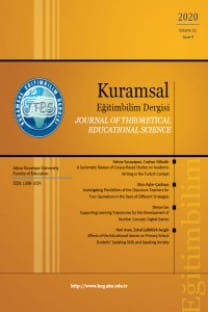Determining the Levels of How Families Shape Children's Engagement with Science: A Scale Development Study
This study aims to develop a scale that can be used to determine the levels of how families shape children's engagement with science. The study was conducted in the basic research design. The data collection was carried out in two stages. In the first stage, the data obtained from the scale, which was applied to 324 people, were subjected to exploratory factor analysis (EFA). In the second stage, data from 181 people were used for confirmatory factor analysis (CFA). As a result of the EFA, it was found that the factor loads ranged from 0.521 to 0.893, the Kaiser-Meyer-Olkin value was 0.866, the total variance explained was 62.254%, and the Cronbach's alpha value was 0.907. As a result of the CFA, however, it was found that the X2/Sd value was 2.08, and the RMSEA value was 0.077. According to the analysis results, a 5-point, 3-factor Likert type scale, consisting of 18 items, was obtained, with validity and reliability. The factors involved in the scale were called "Practical Applications (Activities and Experiments)", "Introduction to Science" and "Building Scientific Foundations". With the developed scale, it is believed that researchers in the field can determine the level of orientation of children of families with different demographics and children of different age groups to science.
___
- Akman, B., Üstün, E., & Güler, T. (2003). Using science process skills in 6 years old children. Hacettepe University Journal of Education, 24, 11-14.
- Aksüt, P. (2019). Erken çocukluk döneminde fen eğitimi nedir? [What is science education in early childhood?] In Pelin A. (Ed.), Erken çocukluk döneminde fen eğitimi [Science education in early childhood] (pp. 1-22). Nobel Academic Publishing.
- Aktamış, H., Ünal, G. & Ergin, Ö. (2008). Öğrencilerin fene yönelik tutumlarına ailelerin etkisi [Students' attitudes towards science influence of their families]. Aile ve Toplum, 14(4), 39-48.
- Archer, L., DeWitt, J., Osborne, J., Dillon, J., Willis, B., & Wong, B. (2012). Science aspirations, capital, and family habitus: How families shape children’s engagement and identification with science. American Education Research Journal, 49(5), 881-908. https://doi.org/10.3102/0002831211433290
- Aydeniz, M. (2017). Eğitim sistemimiz ve 21. yüzyıl hayalimiz: 2045 hedeflerine ilerlerken, Türkiye için STEM odaklı ekonomik bir yol haritası [Our education system and our 21st-century dream: A STEM-focused economic roadmap for Turkey as we move towards 2045 goals]. University of Tennessee
- Ayvacı, H. Ş., Atik, A., & Ürey, M. (2016). The perceptions of preschool children on the concept of scientist. Bartin University Journal of Faculty of Education, 5(3), 669-689. https://doi.org/10.14686/buefad.v5i3.5000193186
- Başbay, A., & Kağnıcı, D. (2011). Perceptions of multicultural competence scale: a scale development study. Education and Science, 36(161), 199-212.
- Bell, R. L. & St Clair, T. L. (2015). Too little too late: Addressing nature of science in early education. In M. C. Trundle & M. Sackes (Eds.), Research in early childhood science education (pp. 125-141). Springer.
- Can, A. (2014). SPSS ile bilimsel araştırma sürecinde nicel veri analizi [Quantitative data analysis in the scientific research process with SPSS]. Pegem A Publishing
- Christensen, L., Johnson, R., & Turner, L. (2014). Research methods, design, and analysis. Pearson.
- DeWitt, J., Osborne, J., Archer, L., Dillon, J., Willis, B., & Wong, B. (2013). Young children’s aspirations in science: The unequivocal, the uncertain and the unthinkable. International Journal of Science Education, 35(6), 1037-1063
- Dierking, L. D., Falk, J. H. (1994). Family behavior and learning in ınformal science settings: A review of the research. Science Education, 78(1), 57-72.
- Fraenkel, J. R., Wallen, N. E. ve Huyn, H. H. (2011). How to design and evaluate research in education. MacGraw-Hill.
- Göçmençelebi, Ş. İ., & Özkan, M. (2010). A study of scale development testing elementary school 6th grade students’ level of relating the knowledge given in science curriculum with everyday life. Journal of Uludag University Faculty of Education, 23(1), 121-132.
- Güler, T., Akman, B. (2006). 6 year old children’s views on science and scientists. Hacettepe University Journal of Education, 31, 55-66.
- Keçe, B., Saraçoğlu, S. & Bektaş, O. (2020). Developing a scientific attitude scale: validity and reliability study. MM-International Journal of Educational Sciences, 4(2), 32-56. https://doi.org/10.46762/mamulebd.774267
- Kefi, S., Çeliköz, N., Erişen, Y. (2013). Preschool teachers’ levels of using the basic science process skills. Journal of Research in Education and Teaching, 2(2), 300-319.
- Kline, R. B. (2005). Principles and practice of structural equation modeling (2nd ed.). Guilford.
- Kunt, B. (2015). The Preschool student's determination of science process skills (60 - 72 months) [Unpublished master’s thesis] Dumlupınar University, Institute of Education Sciences.
- ISSN: 1308-1659
- Yayın Aralığı: Yılda 4 Sayı
- Başlangıç: 2008
- Yayıncı: Afyon Kocatepe Üniversitesi Eğitim Fakültesi
Sayıdaki Diğer Makaleler
Ailelerin Çocuklarını Bilime Yönlendirme Düzeylerini Belirleme: Ölçek Geliştirme Çalışması
Ölçme ve Değerlendirme Amaçlı Geliştirilecek Web 2.0 Aracına İlişkin Alan Uzmanlarının Görüşleri
Zeynep TATLI, Sibel ER NAS, Havva YAMAN, Şeyma TURAN
Bilinçli Farkındalık, Problem Çözme Becerisi ve Akademik Başarı: Algılanan Stres Düzeyi Önemli Mi?
Güçlendirici Liderlik ile Öğretmen İş Performansı Arasındaki İlişki: Örgütsel Bağlılığın Aracı Rolü
